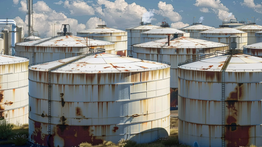
Economic Pressure Mounts for Low-Income Consumers, Corporate Giants Warn
Inflation continues to hit low-income consumers hardest, impacting their spending as noted by top companies.

Inflation continues to hit low-income consumers hardest, impacting their spending as noted by top companies.

HUD's new energy efficiency mandates could increase new home construction costs by up to $31,000.

OPEC+ members, particularly Iraq and Kazakhstan, are implementing compensatory cuts ahead of an important upcoming meeting to determine future production policies.

Hong Kong's newly launched Bitcoin spot ETFs experienced a quieter debut than expected, registering modest trading volumes.

The U.S. economy is teetering on the edge of a 1970s-style stagflation crisis, marked by sluggish GDP growth and rising inflation.

OPEC Secretary General Haitham Al Ghais refutes claims of the oil era's end, emphasizing the resilience of oil demand and advocating for balanced energy policies to prevent investment shortfalls.

The collapse of Republic First Bank, marked by aggressive expansion and financial missteps, signals potential systemic vulnerabilities in the banking sector that could herald a broader crisis.

Nearly 40 million households in the U.S. face financial instability despite being employed, as rising inflation and interest rates force them into a precarious situation.

Inflation continues to hit low-income consumers hardest, impacting their spending as noted by top companies.

HUD's new energy efficiency mandates could increase new home construction costs by up to $31,000.

OPEC+ members, particularly Iraq and Kazakhstan, are implementing compensatory cuts ahead of an important upcoming meeting to determine future production policies.

Hong Kong's newly launched Bitcoin spot ETFs experienced a quieter debut than expected, registering modest trading volumes.

The U.S. economy is teetering on the edge of a 1970s-style stagflation crisis, marked by sluggish GDP growth and rising inflation.

OPEC Secretary General Haitham Al Ghais refutes claims of the oil era's end, emphasizing the resilience of oil demand and advocating for balanced energy policies to prevent investment shortfalls.

The collapse of Republic First Bank, marked by aggressive expansion and financial missteps, signals potential systemic vulnerabilities in the banking sector that could herald a broader crisis.

Nearly 40 million households in the U.S. face financial instability despite being employed, as rising inflation and interest rates force them into a precarious situation.

The Bank of Japan is standing idly by while their currency depreciates past the limit set in September 2022. Is all hope lost for the Japanese Yen?

President Javier Milei's announcement of Argentina's first budget surplus in 16 years highlights a significant economic shift, driven by strict fiscal policies amid high inflation and societal unrest.

Recent U.S. GDP growth figures obscure deeper economic challenges, as rising costs and declining consumer spending hint at underlying vulnerabilities.

Persistent food inflation in the U.S. continues to burden households with rising costs for staples like eggs and beef.

Escalating housing costs and soaring mortgage rates are pushing the American dream of homeownership out of reach for many, amid a static housing market and rising inflation.

The sharp decline of the Japanese yen, falling below 157 against the dollar, has ignited global market fears and spotlighted the limited impact of Japanese officials' interventions.
